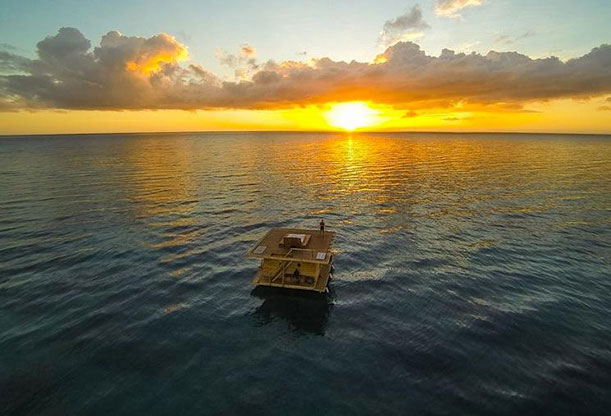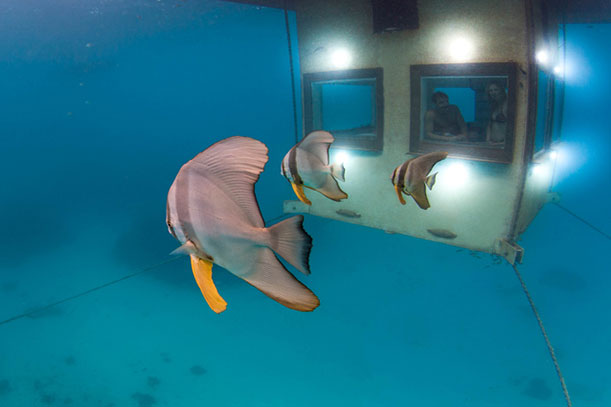Sleeping in This Underwater Hotel Room Is Like Staying in an Artificial Reef
Swedish artist Mikael Genberg explains how his underwater room off the coast of Tanzania can actually be good for the environment
/https://tf-cmsv2-smithsonianmag-media.s3.amazonaws.com/filer/20131121122115underwater-hotel-web.jpg)
For those who haven’t heard, there is such a thing as aquarium therapy. Watching fish, the evidence suggests, may reduce muscle tension, pulse rate and other symptoms of stress.
So you’d imagine that guests staying at the Manta Resort off the coast of Tanzania’s Pemba Island would depart feeling like a trillion bucks after soaking up the immersive panoramic views of exotic sea life made possible by the resort’s newly unveiled underwater hotel room. For $1,500 per room per night, visitors can sunbathe and stargaze on the upper-level sky deck, make relaxing use of the lounge on the water-level or descend down to the submerged chamber where they can cap the night by falling asleep atop a seabed surrounded by the nightlight glow of jellyfish and other bioluminescent marine creatures that swim by.
Anchored to the sea floor about 820 feet offshore at a remote location known as the “blue hole,” where a large number of densely-inhabited coral reefs encircle the floating structure, the resort’s “Underwater Room” is about as secluded as a vacation getaway can possibly get. For the building’s designer, Swedish architect Mikael Genberg, this hardly accessible locale is perfect in that the site meets all the delicate conditions necessary for such a complicated undertaking.

Credit: Jesper Anhede
The 17-room hotel complex is situated on Pemba Island’s westerly coastline, facing toward the serene stretch of ocean that separates the island (population 300,000, with only a couple dozen tourists at any given time) from the mainland. Here, gentle tides barely ripple towards the beach, as the natural opening in the coral reef serves to break the waves. “The best places for something like this are usually lagoons,” says Genberg, who also designed Utter Inn, the world’s first underwater hotel room situated in a lake in Sweden. “Optimally, it should be where other people can’t really reach it.”
Identifying and securing such a “sweet spot” for these types of projects is often the most crucial part of the process. To date, the only other underwater hotels with ongoing vacancies (besides Genberg’s Utter Inn) are single rooms at Jules Underwater Motel in Key Largo and the Rangali Islands Resort in the Maldives. L. Bruce Jones, the developer behind an ambitious multimillion dollar proposal to establish an entire chain of five-star ocean floor dwellings, known as Poseidon Undersea Resorts, once offered a $10,000 reward for anyone who can pinpoint the perfect spot for his venture. Though the developers eventually settled on a chunk of land on one of the Fiji Islands, the project has stalled for reasons unknown.
But for as many ways as such a hard-to-reach region of the world turned out to be ideal, it also made the construction process quite challenging. After striking a deal with the hotel company, workers had to undergo the tricky task of shipping in all the various building materials from Sweden. Construction of the structure was carried out at a nearby yard and then towed to the site. Completing the Underwater Room, as Genberg described, was a two-year ordeal.

Credit: Jesper Anhede
To ensure that operating a hotel room within the reef would remain an environmentally-friendly endeavor, Genberg noted that his team conducted “careful” studies to assess the likelihood of any detrimental impact on the surrounding ecosystem. Solar panels atop the roof deck are designed to supply 100 percent of the power needed, and the only people allowed onboard are guests and assigned resort employees. The real perk, he adds, is that the hotel will eventually become a coral reef, which makes it one of the few development projects that’s actually beneficial to the marine environment.
“If you take a close look at the exterior of the hotel room, you can see fish and other ocean life hiding in the structure,” Genberg says. “And there is already coral growing upon it. It’s like an artificial coral reef.”
Six guests have already stayed overnight in the underwater room, and the resort’s managing director, Matthew Saus, in summing up their reaction, described it as a sense of “awe.”
“You can hear dolphins when snorkeling around the room in the evening but we haven’t had a visit yet,” Saus told the Sydney Morning Herald.
Genberg, who had the honor of being the first person to sleep beneath the waves, felt being there has inspired him to ponder ideas for larger-scale projects, similar to the aforementioned Poseidon project and the proposed Hydropolis Underwater Hotel in Dubai.
“It’s a part of the planet not meant for us as humans to see,” Genberg says. “So I hope that it can give more and more people perspective on how fragile that world is.”
/https://tf-cmsv2-smithsonianmag-media.s3.amazonaws.com/accounts/headshot/tuan-nguyen.jpg)


/https://tf-cmsv2-smithsonianmag-media.s3.amazonaws.com/accounts/headshot/tuan-nguyen.jpg)